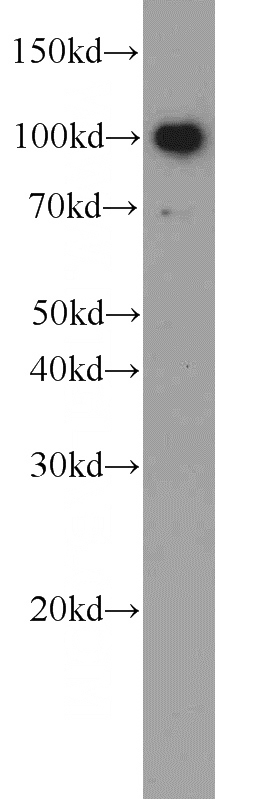-
Product Name
TLR6 antibody
- Documents
-
Description
TLR6 Rabbit Polyclonal antibody. Positive WB detected in RAW 264.7 cells, HT-1080 cells, human brain tissue, Jurkat cells, mouse thymus tissue. Observed molecular weight by Western-blot: 95-110 kDa
-
Tested applications
ELISA, WB
-
Species reactivity
Human, Mouse; other species not tested.
-
Alternative names
CD286 antibody; TLR6 antibody; toll like receptor 6 antibody
-
Isotype
Rabbit IgG
-
Preparation
This antibody was obtained by immunization of TLR6 recombinant protein (Accession Number: BC111755). Purification method: Antigen affinity purified.
-
Clonality
Polyclonal
-
Formulation
PBS with 0.02% sodium azide and 50% glycerol pH 7.3.
-
Storage instructions
Store at -20℃. DO NOT ALIQUOT
-
Applications
Recommended Dilution:
WB: 1:500-1:5000
-
Validations

RAW264.7 cells were subjected to SDS PAGE followed by western blot with Catalog No:116076(TLR6 antibody) at dilution of 1:1000
-
Background
TLR6, also known as CD286, belongs to the Toll-like receptor (TLR) family which are important in the innate immune response to pathogens. TLRs are highly conserved from Drosophila to human and share structural and functional similarities. TLR6 can form a heterodimer with TLR2. TLR6 and TLR2 both are recruited to the macrophage phagosome, where they recognize peptidoglycan, a Gram-positive pathogen component (PMID: 11095740). TLR6 interacts with CD36, following CD36 stimulation by oxLDL or amyloid-beta 42, and forms a heterodimer with TLR4. The trimeric complex is internalized and triggers inflammatory response.
-
References
- Yang H, Zhang X, Geng J, Zheng Z, Fu Q. Toll-like receptor 6 V327M polymorphism is associated with an increased risk of Klebsiella pneumoniae infection. The Pediatric infectious disease journal. 33(11):e310-5. 2014.
Related Products / Services
Please note: All products are "FOR RESEARCH USE ONLY AND ARE NOT INTENDED FOR DIAGNOSTIC OR THERAPEUTIC USE"
